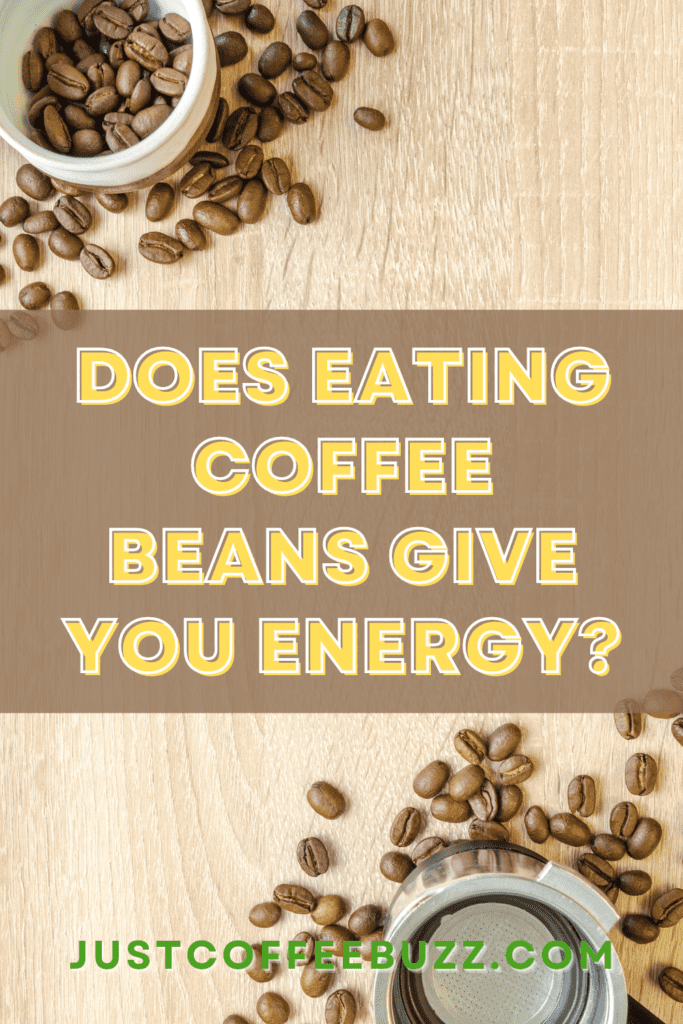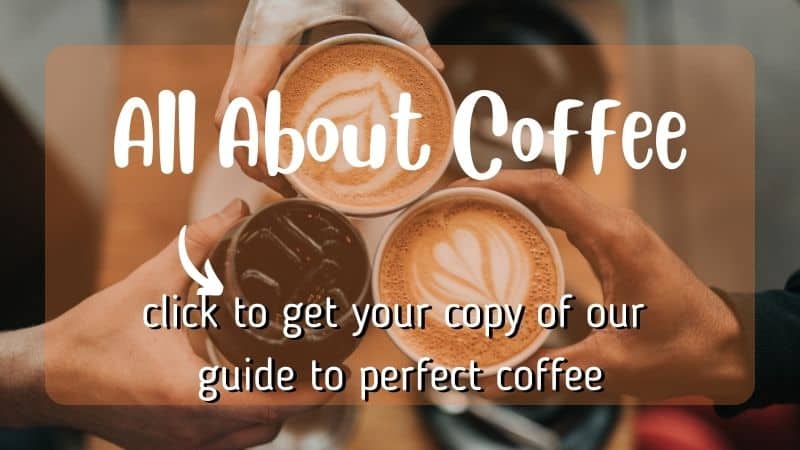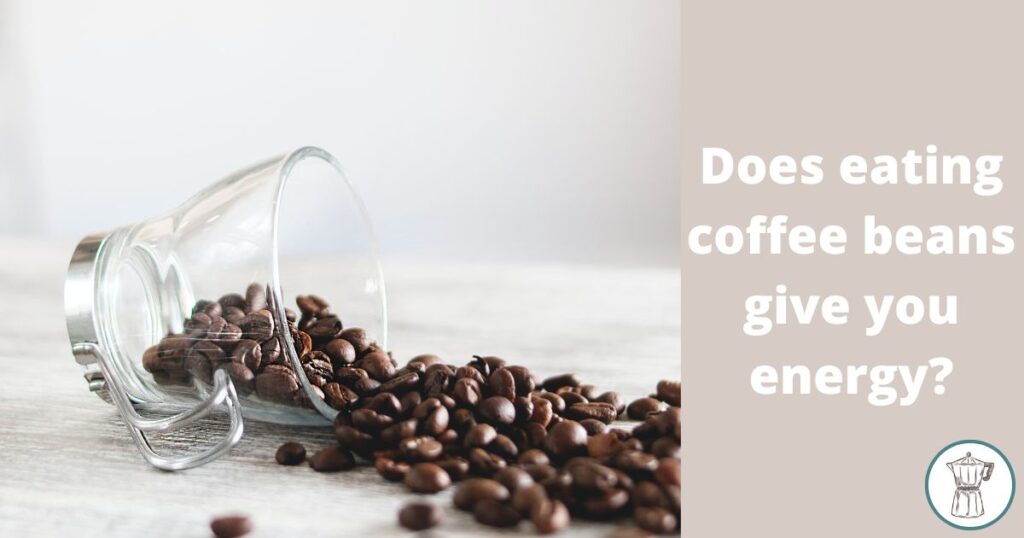The other day I bought whole coffee beans from the supermarket and couldn’t wait to grind and brew great coffee. One question that popped into my head was: Does eating coffee beans give your energy? Have you ever had that thought? Let’s go through the benefits of eating coffee beans.
Does actually eating coffee beans give you an energy boost?
The answer is YES you can eat whole coffee beans to get a real energy boost, and in fact, the caffeine kicks in faster in your body giving you this extra energy coffee often offers to keep you going throughout the day. On the flip side, this alertness doesn’t last as long as the one you get when you have brewed coffee.
The benefits of eating coffee beans are beyond the energy boost
First off, let’s see how long it takes for caffeine from roasted coffee beans to kick in compared to brewed coffee:
- Brewed coffee → 15-30 minutes
- Coffee beans → 3-5 minutes
If you really looking for an immediate energy boost (perhaps before a business meeting), it’s a good idea to munch some coffee beans.

Besides the energy boost coffee beans offer, they help with concentration that can help you be more productive during the day. Antioxidant properties will be found in any cup of coffee as well as coffee beans that help you cleanse your body and get rid of toxins to your overall health.
Chewing on coffee beans also helps with chronic diseases including Alzheimers which is getting more frequent especially among elderly people. Based on recent research, coffee consumption can also help with depression and different types of cancer.
On the other hand, as with brewed coffee, having too many coffee beans can lead to insomnia catching yourself turning and tossing in bed.
How many coffee beans can you have each time?
It depends.
Typically, the caffeine content of a single coffee bean is roughly 6mg.
The US FDA (Food % Drug Association) recommends we can consume no more than 400mg a day. To put things in perspective you can have about 66 coffee beans a day. But this number doesn’t apply to everyone.
Can your body break down caffeine easily? If not, you are caffeine tolerant though, it’s wise to eat less than have of this amount.
Your coffee bean consumption is also dependent on the coffee type; Robusta coffee beans contain more caffeine than Arabica; Robusta has 22mg vs. Arabica has 12mg (coffee per gram).
Another factor that plays a significant role is the coffee roast; dark roast has less caffeine than medium or blonde ones – the longer coffee beans are roasted the less caffeine they contain. If you fancy trying brews made with blonde beans, you’ll find many at Starbucks.
Coffee beans covered with chocolate are rich in caffeine, and in particular only three such coffee beans have 36mg.
Here are five coffee bean brands with super high caffeine content (all in 12 fl oz):
- Black Label Brewed Coffee (12 fl oz): 1,555mg
- Very Storng Coffee (12 fl oz): 1,350mg
- Devils Brew Extreme Caffeine Coffee: 1,325mg
- Taft Coffee: 1,182mg
- High Voltage Coffee: 1,150

Does eating raw coffee beans make you more energetic?
The answer is that you can eat raw coffee beans; they have a distinct tangy and earthy taste that will probably put you off. As mentioned above they are high in caffeine, so you don’t need many of them.
If you’re having stomach issues, it’s wise to skip having them, as they often cause stomach upset.
Did you know that farmers collect ‘coffee cherries’ off coffee trees, and each coffee cherry contains two coffee beans?
Are coffee beans safe to eat?
Yes, they are and I suggest you go for organic coffee beans that grow gradually while no chemicals used to grow them. Buying organic coffee beans might cost your slightly more, but the difference between them and non-organic is just a few bucks, but it’s absolutely worth it if you consider the health benefits.
Can having coffee beans make you hyperactive?
It’s fair to say that eating coffee beans will give you an energy boost, but you won’t become ‘Forest Gump’ all of sudden, running around your country. Foods and drinks that are high in colourings and preservatives often make us hyperactive. For example, I remember myself being hyperactive when I would have too many sweets or sugary fizzy drinks.
How coffee bean consumption helps memory
A good tactic to apply when preparing a test that is around the corner is to munch coffee beans or drink a couple of cups of coffee. Reason being coffee helps with your memory; research carried out fairly recently suggests that participants who had coffee were able to recall more information than those who hadn’t.
What are the negative effects of eating coffee beans?
Let’s go over the downsides of having coffee beans:
- High in acidity: Anyone suffering from acid reflux is better to give coffee beans, and particularly raw coffee beans a skip because they are very acidic. When coffee is brewed some of the acidity is extracted, meaning that coffee beans are high in acidity. Acidity in coffee is such that you need to be careful how to use it with your lawn grass.
- Cholesterol: Besides caffeine, coffee beans contain cafestol which can cause high cholesterol in the long term. Brewed coffee filtered with either cloth, paper or metal filters is lower in cafestol content than coffee beans. (Do you know how to remove cafestol from your brew?)
- Bitter taste: Although some have coffee beans as a snack, the reality is that most of us when tasting coffee beans find them too bitter to have them regularly.
Can consuming coffee beans help you shed a few extra pounds?
Yes it can help you lose weight, as coffee is rich in chlorogenic acids (that help you break down carbohydrates faster) and antioxidants. Having raw coffee beans is a better option than roasted; when coffee beans are roasted most of the chlorogenic acids are extracted.
Let’s wrap it up
Ready to munch some coffee beans? Give it a go and if you find it that it’s not up your street just stick to brewed coffee.

- How to Remove Coffee Stains From Countertop The Easy Way - December 21, 2023
- Can You Reuse Coffee Grounds in French Press? Truth Inside - December 12, 2023
- Can Expired Coffee Creamer Make You Sick? 3 Ways to Find Out - December 9, 2023
